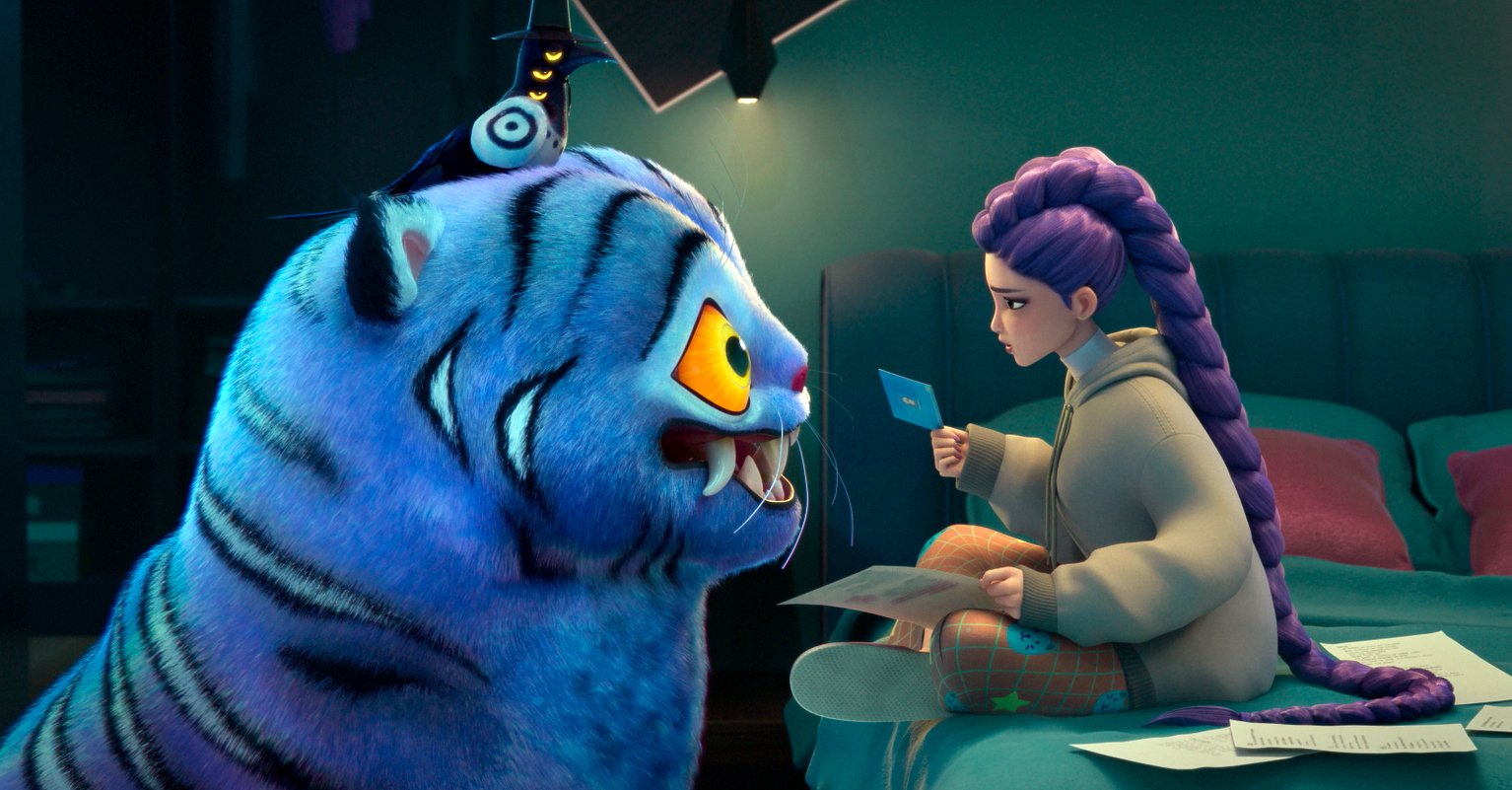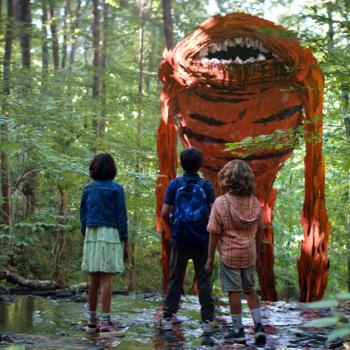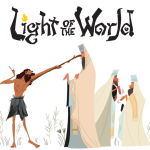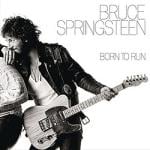Take Buffy the Vampire Slayer, Korean contemporary pop music and ancient folklore, gorgeous anime-flavored animation, and a soundtrack that gets under your skin (but in a good way), and you have Netflix’s smash-hit film KPop Demon Hunters.
Released in June both on Netflix and briefly in theaters (including sing-along showings), KPop Demon Hunters — an American production from Sony Animation — netted about $18M at the box office. It has also dominated Netflix’s viewing stats (it’s currently only available on Netflix), and four songs from its soundtrack landed simultaneously on the Billboard Top 10.
And it achieved this without blood and gore, profanity, sexual situations (there are some animated abs on display) or political messaging.
I don’t know much about Korean pop or folklore, only a bit about anime, but a whole lot about Buffy, so I checked it out.
I liked it, a lot.
And I’m not alone, so yes, there will be a sequel.
BTW, if you want to stay spoiler-free, don’t watch any of the official Sony or Netflix music clips embedded below. They give away plot points, but I’m including them so that folks with concerns can get a clearer picture of the film’s content. You’ve been warned.
But this first one is just the trailer, so it’s safe:
What Is KPop Demon Hunters About?
The film focuses on Korean pop music (K-pop, for short) girl group Huntrix, stylized as HUNTR/X, led by Rumi, whose powerful voice and elaborate costumes hide a secret.
The trio is the latest iteration of the three girls in any generation chosen to use their singing voices — and some magical weaponry — to kill demons seeking to deliver human souls to the demon leader, Gwi-Ma.
The girls’ uplifting music, combined with the energy of their devoted fans, also creates the Honmoon, a shield between our world and the demon world.
Yeah, I know how it sounds. But hear me out.
Despite seeming silly on the surface, the film is anything but. It’s sharply written and immaculately paced by co-directors Chris Appelhans and Korean-Canadian Maggie Kang. Both directors also contributed to the screenplay, based on a story from Kang.
KPop Demon Hunters is funny, dramatic, heart-tugging, surprisingly complex, beautiful to look at — and chock-full of catchy tunes with lyrics that actually say something.
Huntrix’s rival for the souls of the fans is a demon boy band, the Saja Boys, led by the deeply conflicted and formerly human Jinu (a k a Rumi’s love interest).
In a bit of wordplay, depending how it’s pronounced, saja can refer to a lion (the band’s symbol), or to an emissary from the underworld, a sort of Grim Reaper (the singers are demons, after all).
BTW, I learned this from a video by a Korean teacher who explains much of the film’s language and symbols. He also did a second video focusing even more on language.
Yeah, But, Demons
I get why some Christians, especially parents, might be concerned about the whole “demons” thing.
In reality, about one-third of South Koreans are Christian, with about 11 percent specifically Catholic. The Church took root there almost entirely through the efforts of lay people, and there are many Korean martyrs and saints.
But, while season one of Netflix’s hit Korean-produced series Squid Game did reflect this with Christian characters and references, roughly half of modern South Koreans don’t identify with any religion.
Unlike Buffy, in which non-religious creator Joss Whedon played around with Christian themes and symbolism, KPop Demon Hunters stays entirely in the realm of Korean mythology, folklore and traditional beliefs in spirits.
These include demons, which are not the fallen-angel type found in the Bible. Instead, they’re more like mischievous goblins, ghosts, or messengers from the underworld.
So, yes, there are demons, but other than the good-looking boy-band ones, the demons are generally goofy-looking. And they’re way less scary than some of the creatures in Angel Studios’ recent comedy-horror film Sketch.
There’s also a white tiger obsessed with flowerpots, and a hat-wearing magpie with three eyes stacked like the cameras on a Samsung Galaxy phone (other than the three eyes, that’s also from traditional Korean folk art).
Along With Cultural Specifics, There Are Universal Themes
The film’s themes include shame that comes from keeping secrets and not being honest about yourself, the importance of friendship and duty, and the transformative power of love.
And, even though the main characters are female, they’re not girlboss types — and there’s a lovely example of a man offering self-sacrifice to find redemption and save the day.
While some may see the idea of suffering coming from not being your true self as referring to specific groups, it’s truly a universal theme. Any subtext is in the eye and psyche of the beholder.
(This clip is particularly spoilery.)
No, the film is not specifically Christian or Biblical, but not everything that is worthwhile has to be.
My own heritage is Irish, and in Ireland, folk beliefs — like the “little people,” shape-shifting púcas and half-human/half-seal selkies — have coexisted with Catholicism for centuries.
All these products of the human imagination can be used in service of good stories that express moral truths.
Is it For Kids?
Netflix rates KPop Demon Hunters as PG, and I concur. Since it can be watched at home, parents can monitor the reaction of kids, especially littles, and act accordingly.
One Catholic mom I know didn’t entirely approve of the girls’ midriff-baring outfits, but other than that, she didn’t have any issues. It may take a minute to explain the Korean folk concept of a “demon” to a kid, but I think they’ll understand we’re in a fantasy world.
The film does point out the dangers of worshiping musicians as idols, or any false idols — there’s even a song about it.
Priest Reacts to KPop Demon Hunters
Here’s a theological reflection from a Korean-American priest whose parishioners asked him to review the film:
A Sad Side Note From the Real World
While the girls of Huntrix have a caring manager called Bobby and a lot of personal autonomy, the real world of Korean entertainment has a decided dark side.
There have been a number of suicides of South Korean pop stars and actors. In February, actress Kim Sae-Ron took her own life after a drunk-driving conviction brought on a flood of negative press and online bullying.
From BBC News:
South Korea is known for its hyper-competitive culture in most spheres of life – from education to careers. It has one of the highest suicide rates among developed countries.
This pressure is heightened in the case of celebrities. They face immense pressure to be perfect, and are subjected to the demands of obsessive “super fans” who can make or break careers.
That is why even the slightest perceived misstep can be career ending. Kim Sae-ron became so unpopular, scenes featuring her were edited out of shows such as Netflix’s 2023 drama Bloodhounds.
“It is not enough that the celebrities be punished by the law. They become targets of relentless criticism,” Korean culture critic Kim Hern-sik told the BBC.
He referred to K-pop artists Sulli and Goo Hara, who died by suicide in 2019 after long battles with internet trolls, even though they did not have known brushes with the law.
Sulli had offended fans for not conforming to the K-pop mould, while an internet mob had targeted Goo Hara over her relationship with an ex-boyfriend.
The same sad fate befell K-pop star Moonbin in 2023. Also from BBC News:
The death of K-pop star Moonbin has shocked fans around the world – and again highlighted the pressures such performers face.
The 25-year-old member of boy band Astro was a singer, actor and model. His death came in the middle of a world tour of his duo with fellow Astro member Sanha.
While the exact cause of death is still being investigated, police said Moonbin “appears to have taken his own life”.
It’s the latest in a string of sudden young celebrity deaths to hit the South Korean entertainment industry.
Ultimately, the most fanciful aspect of KPop Demon Hunters may not be the mythology and folklore creatures, but the joy and camaraderie of the singers. It’s not a tale unique to the young members of Korean girl groups and boy bands either — just ask the members of *NSYNC or One Direction.
In the real world, not all demons attack from the outside.
Image: KPOP DEMON HUNTERS – (Right) Rumi (voice by ARDEN CHO). ©2025 Netflix
Don’t miss a thing: Subscribe to all that I write at Authory.com/KateOHare.














